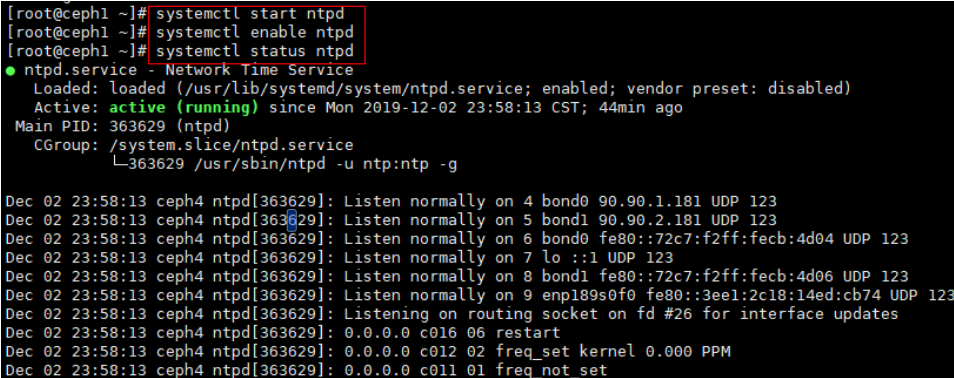配置部署环境
- 关闭防火墙。
关闭本节点防火墙,需在所有服务端节点和客户端节点依次执行如下命令。
1 2 3
systemctl stop firewalld systemctl disable firewalld systemctl status firewalld

- 配置主机名。配置永久静态主机名,服务端节点配置为ceph1~ceph3,客户端节点配置为client1~client3。
- 配置节点名称。
- ceph1节点:
1hostnamectl --static set-hostname ceph1
- client1节点:
1hostnamectl --static set-hostname client1
其余节点的主机名配置可参照上述示例。
- ceph1节点:
- 修改域名解析文件。
1vi /etc/hosts在所有服务端节点和客户端节点的“/etc/hosts”中添加如下内容。
1 2 3 4 5 6
192.168.3.166 ceph1 192.168.3.167 ceph2 192.168.3.168 ceph3 192.168.3.160 client1 192.168.3.161 client2 192.168.3.162 client3

- 以上的IP地址仅为示例,需根据实际情况进行替换。可通过ip a命令查询实际IP地址。
- 服务端节点主机名建议配置为ceph1~ceph3。
- 客户端节点主机名建议配置为client1~client3。
- 上述示例以3节点服务端和3节点客户端为例,根据实际节点数量调整。
- 配置节点名称。
- 配置NTP。由于Ceph会自动校验存储节点之间的时间,若时差较大将触发告警,因此需要配置时钟同步。
- 安装NTP服务。
- 在所有服务端节点和客户端节点安装NTP。
1yum -y install ntp ntpdate
- 在所有服务端节点和客户端节点备份旧配置。
1cd /etc && mv ntp.conf ntp.conf.bak
- 以ceph1为NTP服务端节点,在ceph1新建NTP文件。
1vi /etc/ntp.conf并新增如下内容作为NTP服务端。1 2 3 4 5 6 7 8 9
restrict 127.0.0.1 restrict ::1 restrict 192.168.3.0 mask 255.255.255.0 server 127.127.1.0 fudge 127.127.1.0 stratum 8 restrict default kod nomodify notrap nopeer noquery interface ignore wildcard interface listen x.x.x.x(此处为服务器的IP地址)

其中,“restrict 192.168.3.0 mask 255.255.255.0”是ceph1所在的IP网段与掩码。
- 在ceph2、ceph3及所有客户端节点新建NTP文件。
1vi /etc/ntp.conf并新增如下内容,其中IP地址为ceph1的地址。1server 192.168.3.166
- 在所有服务端节点和客户端节点安装NTP。
- 启动NTP服务。
- 在ceph1节点启动NTP服务,并检查状态。
1 2 3
systemctl start ntpd systemctl enable ntpd systemctl status ntpd

- 在除ceph1的所有节点强制同步server(ceph1)时间。
1ntpdate ceph1
- 在除ceph1的所有节点写入硬件时钟,避免重启后失效。
1hwclock -w
- 在除ceph1的所有节点安装并启动crontab工具。
1 2 3 4
yum install -y crontabs systemctl enable crond.service systemctl start crond crontab -e
- 添加以下内容,每隔10分钟自动与ceph1同步时间。
1*/10 * * * * /usr/sbin/ntpdate 192.168.3.166
- 在ceph1节点启动NTP服务,并检查状态。
- 安装NTP服务。
- 配置免密登录。
在ceph1节点生成公钥,并发放到各个服务端/客户端节点。
- 对于ceph1、ceph2、ceph3、client1、client2、client3的三节点网络。
1 2 3
ssh-keygen -t rsa for i in {1..3};do ssh-copy-id ceph$i;done for i in {1..3};do ssh-copy-id client$i;done
- 对于ceph1、client1的单节点网络。
1 2 3
ssh-keygen -t rsa ssh-copy-id ceph1 ssh-copy-id client1

输入第一条命令“ssh-keygen -t rsa”之后,按回车使用默认配置。


- 对于ceph1、ceph2、ceph3、client1、client2、client3的三节点网络。
- 设置permissive模式。
设置permissive模式,需在所有服务端节点和客户端节点执行。
- 临时关闭,重启操作系统后失效,与下一条互补。
1setenforce permissive
- 永久设置,下次重启自动生效。
1vi /etc/selinux/config修改SELINUX=permissive。

- 临时关闭,重启操作系统后失效,与下一条互补。
父主题: 部署Ceph